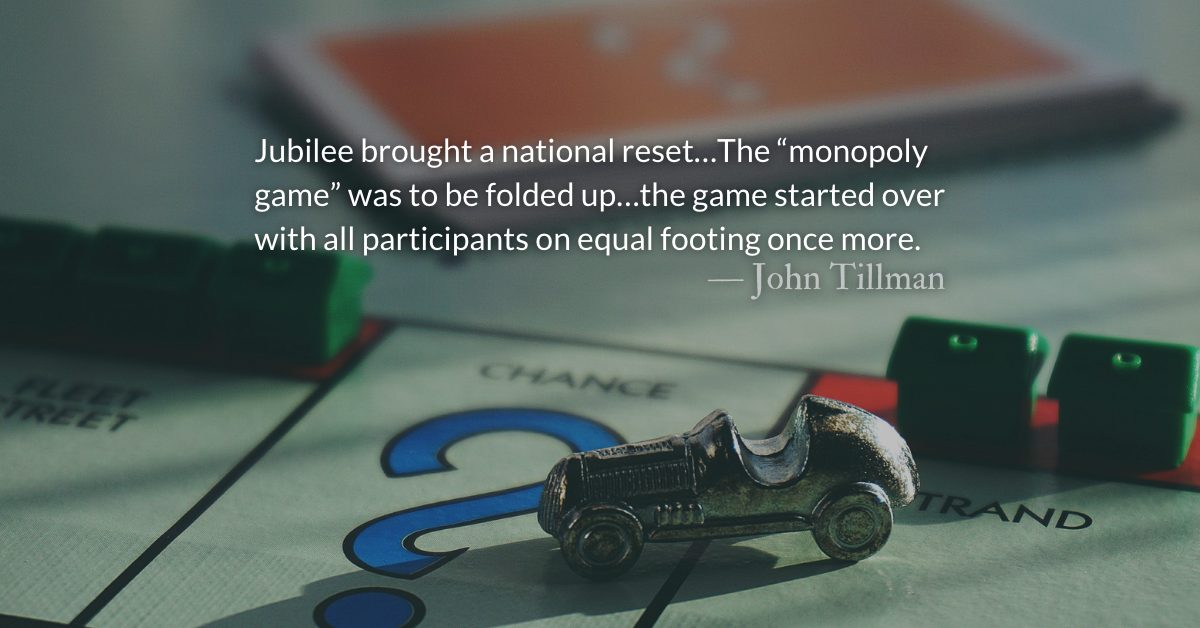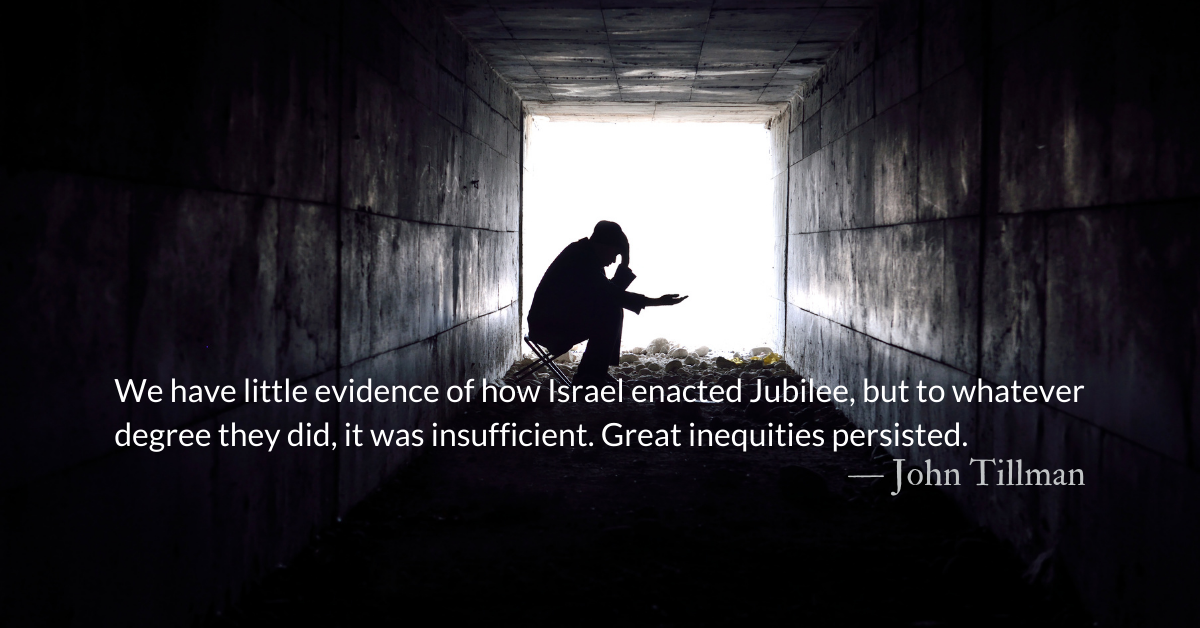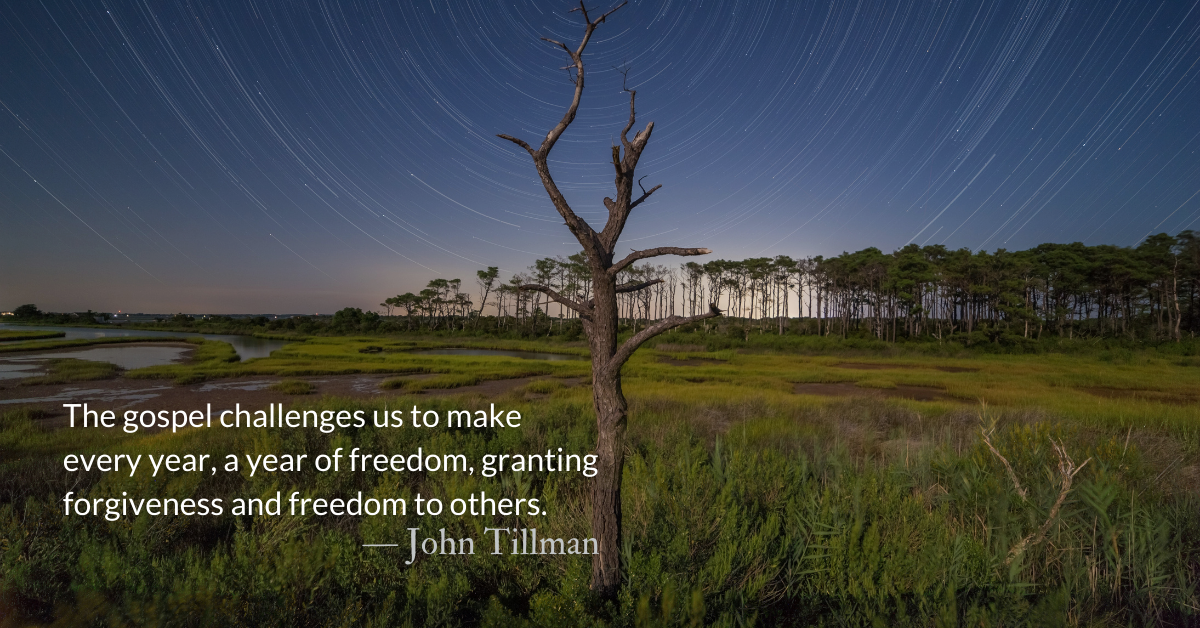Scripture Focus: Leviticus 25.9-10
9 Then have the trumpet sounded everywhere on the tenth day of the seventh month; on the Day of Atonement sound the trumpet throughout your land. 10 Consecrate the fiftieth year and proclaim liberty throughout the land to all its inhabitants. It shall be a jubilee for you; each of you is to return to your family property and to your own clan.
Reflection: Beyond Jubilee
By John Tillman
Weekly sabbaths bring us freedom and joy in this world. This freedom and joy grows more expansive as we ponder the sabbath of years and Jubilee.
Sabbath years built, in an exponential crescendo, to Jubilee. After seven septennial sabbath years, trumpets were to announce liberty throughout the land. Liberty from debt. Liberty from enslavement. Jubilee brought a national reset of property and land ownership. The “monopoly game” was to be folded up, properties redistributed, and the game started over with all participants on equal footing once more. This was to remind Israel that the land did not belong to them. It belonged to the Lord.
It is difficult for us to imagine such an economic system. In the dominant economic systems of their world and ours, the game never stops and each generation starts the game with an inherited benefit or handicap. Generational wealth and poverty are features, not bugs, of every world economic system in history.
Biblical laws are intended to be a check on our tendencies toward greed, violence, and inequity. Jubilee was a systemic reboot, restoring the moral code God desired—equity, justice, righteousness, unity.
Talking about Jubilee upsets some people. Some dogmatically demand implementation of Jubilee in today’s economic terms, even though they would not submit to any other laws from the Old Testament. Others work just as stubbornly to deemphasize or even ignore Jubilee because it conflicts with their economic beliefs. (It is beyond the scope of this devotional to discuss how some of us have greater religious devotion to and faith in sociological, economic, and political ideas than we do in scripture or theological ideas…)
We must remember that many systems and laws in the Bible, like Jubilee, are bandaids on gaping wounds. For example, Jesus challenged laws regarding marriage and the sabbath, saying they did not complete God’s intention or will. (Matthew 19.3-12; Mark 2.23-28; Luke 6.1-10; Luke 13.10-16) We have little evidence of how Israel enacted Jubilee, but to whatever degree they did, it was insufficient. Great inequities persisted. (Deuteronomy 15.7, 11; 1 Samuel 2.8; Isaiah 41.17; Matthew 19.21, 26.11)
Implementing Jubilee would be insufficient. The gospel compels us to go beyond it. As the sacrifice of Christ surpasses the sacrifice of lambs, and our righteousness must surpass that of the scribes and Pharisees, our sacrificial generosity should surpass that of Jubilee. (Matthew 5.20)
In Jesus, Jubilee is now and forever. Jubilee is the gospel. (Isaiah 55.1-2; John 7.37; Revelation 22.17)
May our voices and actions be jubilant trumpets declaring liberty, freedom, and joy.
Divine Hours Prayer: The Morning Psalm
Our iniquities you have set before you, and our secret sins in the light of your countenance. — Psalm 90.8
– From The Divine Hours: Prayers for Springtime by Phyllis Tickle.
Today’s Reading
Leviticus 25 (Listen 7:41)
Acts 21 (Listen 5:55)
This Weekend’s Reading
Leviticus 26 (Listen 6:22), Acts 22 (Listen 4:26)
Leviticus 27 (Listen 4:45), Acts 23 (Listen 5:15)
Read more about Supporting Our Work
Please consider becoming a donor. Support ad-free content that brings biblical devotionals to inboxes across the world.
Read The Bible With Us
It’s never too late to join our Bible reading plan. Immerse in the Bible with us at a sustainable, two-year pace.










